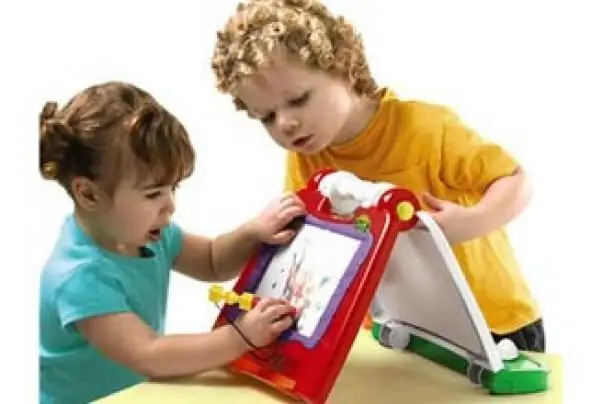2026 Author: Priscilla Miln | miln@babymagazinclub.com. Last modified: 2025-01-22 17:55:13
It is quite a common situation when a child of 3 years old does not obey. What to do in this case, not all parents know. Many of them try to calm the child with persuasion, shouting and even physical impact. Some adults just go on about the baby. Both of them make mistakes. Why does a three-year-old child not obey and how to stop it? The publication will answer these questions.
Crisis of three years
To understand why the baby does not obey, you need to understand child psychology. As a rule, at the age of 3, a child already considers himself a person, an adult with his own needs and desires. Adults continue to treat him like a stupid kid. Because of this, misunderstandings, tantrums and conflicts arise.
In general, a child's disobedience at 3 years old is the norm. As psychologists and psychiatrists say, this age coincides with a crisis that is neededfor further personal development. It may occur a little earlier or later (at 2.5 - 4 years). It all depends on temperament, upbringing and the degree of trust in the relationship between the baby and the parents. That is, a child does not obey at 3 years old, not because he is bad, but because personal changes are taking place with him.
How can you characterize the crisis of this age? Children begin to develop such traits as stubbornness, negativism, obstinacy, self-will, rebelliousness, depreciation, despotism. Psychologist L. S. Vygotsky believed that these qualities are necessary for the formation of a sense of recognition and self-respect, although they create difficulties for adults. Modern psychiatrists fully agree with this.

Defending independence
At 3 years old, children begin to separate themselves from other people, realize their capabilities and feel like a source of will. Toddlers compare themselves to adults and want to do the same things they do. For example, "I'm already big, I'll tie my shoelaces myself!" At the same time, the child begins to feel autonomy from mom and dad. He realizes that he is a separate person who has his own desires, preferences and tastes. This contributes to the formation of an internal protest, so a child at 3 years old does not obey and becomes hysterical. For example, he can call names, break toys, offend other children, refuse to eat porridge that his mother cooked. Because of this, adults get the impression that the child is simply testing their nerves.
The kid is acting disgustingonly because it seems to him that adults want to limit his freedom with some conventions and rules. And with his disobedience, he begins to check how significant these limits are for others and what will happen if they are violated.
Manifestation of independence
Children at 3 years old want to be perceived as adults, so they are very offended if they are called small. At this age, a positive image of “I” develops, so kids love to flaunt their successes and be the center of attention. Achievements add optimism to them, which allows them to consider themselves good. And I want to do everything on my own, without anyone's help. A child at 3 years old does not obey his parents, because every immutable truth is questioned. There is absolutely no desire to do everything only at the behest of adults. Only a careful review of the rules of conduct can help shape your view of the world.

Expanding horizons
The reason for the disobedience of a three-year-old baby may be the expansion of horizons. At this age, everything becomes interesting and you want to explore such a huge world around you on your own. Even if mom says not to go there, the little one takes it as a challenge. He just wonders what's so unusual about it.
Fatigue
A child at 3 years old does not obey, screams and cries, it would seem, for no reason? It is worth thinking about the daily routine of your child. Some parents already at such an early age begin to load their baby with numerous knowledge and skills,writing it down in all sorts of circles. This can lead not only to physical, but also to emotional fatigue. Hence the unbalanced psychological state and disobedience.
Authoritarian parenting style
He assumes that the parents are in command, and the child unconditionally follows any instructions and unquestioningly obeys. At the same time, adults are not interested in the desires of the child, which makes it very offensive. Such encroachments on the "I" can form a rather revolutionary mood. As a result, the child begins to throw tantrums, just to be heard. This is a kind of baby cry for respect as a person.
Tension in the family
In some families, parents are disrespectful to each other, use foul language and even raise their hand against their neighbor. And there is nothing surprising in the fact that their child at the age of 3 does not obey and fights. He simply copies the adult behavior pattern typical of the family, believing that such behavior is quite normal.

What to do?
A 3-year-old child does not obey so much that it seems that nothing can be done about it. Parents just give up and go on about their little monster. For example, it is easier for a mother to remove toys herself than to endlessly ask a little one about it. But you can’t do nothing, otherwise the situation will worsen. If you do not stop the wrong behavior, then the child will feel permissiveness. But it is important to understand how to properly meet the needs of the child in order to correct it.development back on track.
Keeping the daily routine
Most parents do not ration the day of the crumbs, and make a mistake. It is very important to separate the moments of feeding, cognitive activities, play and rest. You need to allocate time for each component, preferably at the same hours. This will help to form a habit in the baby to follow these rules. It becomes clear to him that certain events are followed by others. As a result, the child ceases to be irritable, aggressive and anxious. If there is no regime, then you should not be surprised that a child at 3 years old does not obey. He just doesn't know what to expect and what to do next.
Prohibitions and restrictions
Of course, if everything is allowed to the little man, then in the end it will result in disobedience. Having once made a concession, there is a great risk of being in a disadvantageous position. Then do not be surprised why the little one behaves like a little devil.

In fact, it is very easy for parents to lose their authority in the eyes of the child. Therefore, it is necessary to explain to him from an early age what is allowed and what is prohibited. This rule should apply to all children of any age. Prohibitions are an integral part of proper education. If they are not introduced, then the end result is obvious - the child does not obey. By the age of 3-5, children usually begin to clearly understand what can and cannot be done.
Fair prohibitions and restrictions are useful for forming a baby's adequate attitude towards himself and the world. If aeverything will be allowed, then he will soon cease to appreciate what he has, and will take everything for granted. In addition, many bans are necessary for the safety and he alth of children.
But you should understand that you do not need to limit the child in everything. Otherwise, you can create obstacles for development. If a three-year-old peanut behaves ugly, then he does not realize this. He just wants to feel significant and important.
Justify punishments
If a child of 3 years old does not obey, what should I do? Of course, he should be punished. But you need to explain your method of influence. The kid must understand that he acted badly, and for what exactly he is being punished. Otherwise, he can get very angry and hold a grudge for many years. Sometimes it seems to parents that everything is clear here anyway, and there is no need to explain the reason. But it's not. The crumbs are not yet able to instantly compare all the facts and come to the appropriate conclusions. If everything is calmly explained to the child, then he will no longer be so offended, and he will begin to reflect on his act.

How should a child be punished? Many parents use not only verbal, but also physical methods of influence. Psychologists and psychiatrists note that the latter methods are absolutely unacceptable. Studies show that this measure does not improve the emotional contact between children and adults, but, on the contrary, alienates them from each other. Physical punishment leads not only to misunderstanding in relationships, but also to the formation of resentment and variouscomplexes. As a result, the grown child will behave inappropriately, aggressively and become uncontrollable.
Can small children be punished verbally? What do experts think about this and what advice do they give? A child at 3 years old does not obey only for the reason that this is not stopped in any way. Wrong behavior must be corrected - so say psychiatrists and psychologists. If the baby behaves inappropriately, then the father or mother should immediately express their opinion and make it clear that they do not approve of such actions. Punishments like “Then I won’t buy a toy”, “You won’t watch TV” are absolutely ineffective. If a child allows himself to be pranks or is capricious, it will be enough to calmly make a remark to him and explain, without shouting, why it is impossible to behave this way. This method of influencing a naughty child will be the most correct.
Separate act from person
Psychologists also note that parents often make the mistake of verbally punishing a child. If he does something bad, then he is immediately called bad. But it's not like that. The kid just did something that goes against society's notion of norms.

If a child of 3 years old does not obey - what to do and say in this case? It would be correct to say that an act is ugly, therefore it characterizes a person from a bad side. With this approach, the personality of the baby itself is not affected. You need to be extremely careful in choosing expressions. At this age, it is very easy for children to believe in their worthlessness and inferiority. ATas a result, the child will not obey, but as a plus, he will develop self-doubt.
Can a child give in?
Children are smart enough even at an early age. Therefore, they quickly realize that they are constantly inferior. But adults should not give up, especially if their child is making a scene. In situations where a child at the age of 3 does not obey, Komarovsky Evgeny Olegovich, a well-known doctor and writer, recommends that adults ignore tantrums and other inappropriate behavior. Crying and whims, children test the nerves of their parents for strength. If you remain calm and do not react in any way, then the impact of the tantrum will be postponed until the next event, and over time it will be completely forgotten.
Of course, you need to take a reasonable approach to everything and in some cases give in to your baby, because he is only learning this world. According to experts in the field of psychology, those things that contribute to the development of character and help to stay safe should always remain unshakable. For example, a child should know from an early age that one should not play on the road, run a red light, play with fire, make noise in a public place. You can and should give in to the little one if he is sick. At such moments, children should receive special support and attention. If a child wants a desired toy, then it should be bought not on demand, but, for example, for the next holiday. So the baby will learn to understand that everything costs money and is not given just like that.

A child does not obey at 3 years old: advice from psychologists and psychiatrists
- Do not be provocative, patiently talk to the child in a calm tone.
- Do not give up, defend your position to the end.
- When tantrums do not need to tell that it's bad. This will only increase the crying and screaming. Better to ignore or divert attention to something else.
- You can't force a child to act directly. It is much more efficient to do this in a playful way.
- You can substitute desires. For example, “Today you won’t be able to buy ice cream, but juice and fruit yogurt are easy!”
- If the baby requires something, you can give him the right to choose, but only from those options that are suitable for an adult.
- Always encourage children to be independent.
When a three-year-old child does not obey, you need to show patience, understanding and diplomatic skills. Do not forget that the child learns the world and is still learning to behave in it.
Recommended:
Raising a child (3-4 years old): psychology, tips. Features of the upbringing and development of children 3-4 years old. The main tasks of raising children 3-4 years old

Raising a child is an important and main task of parents, you need to be able to notice changes in the character and behavior of the baby in time and respond to them correctly. Love your children, take the time to answer all their "whys" and "what for", show care, and then they will listen to you. After all, the whole adult life depends on the upbringing of a child at this age
A child at 2 years old does not sleep during the day: possible causes, the child's regimen, stages of development and the meaning of sleep

Many parents worry about the fact that a child at 2 years old does not sleep during the day. Some people think that this is not necessary at all - they don’t want to, well, they don’t need to, they will lie down early in the evening! And this approach is completely wrong, preschool children must have a rest during the day, and sleep is an obligatory stage of the regimen. During sleep, children do not just rest, but also grow, the nervous system normalizes, the immune system rises, and without sleep, all this will fail
Constipation in a child 2 years old - what to do? Causes and treatment of constipation in children 2 years old

Babies can very often have bowel problems. After all, their body is still being formed. But besides the main problem, there is another one. The baby cannot explain to his parents what worries him. Therefore, one should be extremely careful in order to recognize in time the symptoms that characterize constipation in a child (2 years old). And it is important to know how to help the baby
Child does not want to learn: advice from a psychologist. What to do if the child does not want to study

Sending their inquisitive kids to school, many parents do not even suspect what difficulties they will face in the near future. The pedagogical practice of recent years shows that the number of children who do not gravitate towards learning is growing rapidly from year to year
Where to give a child at 4 years old? Sports for children 4 years old. Drawing for children 4 years old

It's no secret that all adequate parents want the best for their child. And, of course, so that their precious children become the smartest and most talented. But not every adult understands that they have only one right - to love the baby. Very often this right is replaced by another - to decide, to order, to force, to manage. What is the result? But only that the child grows up depressed, insecure, indecisive, not having his own opinion

